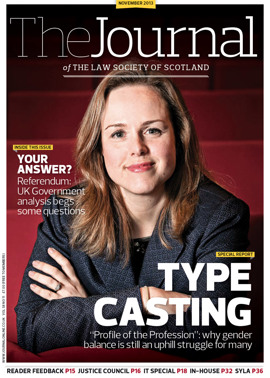Opinion column: Ros McInnes

The Scottish courts are revisiting the issue of television in the courts after 21 years of the guidelines Lord Hope introduced when he was Lord President. BBC Scotland will be responding to the consultation in full as a solid supporter of open justice, and it will do so in constructive terms.
However, Lord Hope's bold and far-sighted innovation has been overtaken by lack of event, as the consultation document itself demonstrates. Two decades of seminal court proceedings - Glasgow Sheriff Court alone is probably the busiest court in Europe - and the actual instances of filming in Scottish courtrooms can be covered on two sides of A4, double-spaced. Meantime, almost all of the UK Supreme Court proceedings have been filmed since it opened in 2009, and filming has just commenced in the Court of Appeal. By the time this piece is published, the DVD footage broadcast from the Court of Appeal may well outstrip what has been done in the Scottish jurisdiction since 1992.
When discussing this matter with colleagues in London preparing for the Court of Appeal filming, I could only strike the optimistic note that, once the cameras are in, and the broadcasts out, it seems to work fairly smoothly. Channel 4's Nat Fraser documentary was well received, as was BBC Scotland's "Sheriff Court" documentary and, reaching back into the mists of time, "The Trial". Contrary to the suggestion in the consultation document, "Sheriff Court" did not need to be heavily edited as the result of court action. So it has been alright so far as it has gone, but it has not gone very far very often, despite the commitment shown by the public service broadcasters. It feels, as G K Chesterton said of Christianity, not like something which has failed but something which has never been tried.
By "tried", I mean, bluntly, tried by the courts. Could there ever be a better case for televising a trial than there was for Lockerbie? - no jury, far from the country in which it was ostensibly taking place, two accused men whose photographs had been shown around the world for many years, the engagement of the public interest at the most overwhelming level - and yet it was refused. Bids to record such apparently educational and harmless pieces of legal action as a charge to the jury have been summarily refused, as in the Tommy Sheridan perjury trial. Other bids for selected pieces of evidence have been criticised as coming too late, when there is no timescale for application. We have been told that televising of evidence for non-documentary use was not competent in terms of the guidelines, while this has clearly been permitted in other situations. And so on. The overall effect is, to put it kindly, capricious.
So one awaits the results of the new consultation with a combined sense of déjà vu and jamais vu. O J Simpson will be mentioned a lot. Adjectives like "prurient" and "exploitative" will be used, often by people whose income depends largely on the continuation of crime. Arguments will be made against televising the courts which are, logically, arguments for secret trials: for example, if the concern is that witnesses will hear the evidence of other witnesses, the same could be said about the near verbatim reports of Victorian newspapers. There will be entertainingly surreal observations about witness intimidation, in the context of a court system where the principal players are dressed in wigs and gowns and whose first interaction with witnesses is to place them in a box and obliquely threaten them with the oath.
No broadcaster will ever make a commercial or a ratings killing on the back of the sort of use of television in court that has ever been permitted or likely in this jurisdiction. It is much more probable that they will require to commit speculatively a huge amount of resource, technological, financial and administrative, to obtain footage which will be in the public interest, rather than of interest to most of the public. In the meantime, our neighbours to the south will get on with the steady and unmelodramatic business of making open justice a reality through the most pervasive medium of the time. The ball audaciously pitched by Lord Hope in 1992 has perhaps been dropped on too many occasions for the Scottish broadcasters to come running - although I would be delighted to be proved wrong.
Rosalind M M McInnes is Principal Solicitor, BBC Scotland Legal Department
In this issue
- Obituary: Professor Ian Willock
- Competition damages – a rocky road ahead?
- Heart of the matter
- Law reform on track
- Turning back the clock
- Golf and the right to roam
- Reading for pleasure
- Opinion column: Ros McInnes
- Book reviews
- Profile
- President's column
- Fee review open to views
- Some more equal than others
- Balancing act
- Paving the road to reform
- Blue sky thinking?
- A singular status
- You pay your money
- Acceptable BYOD use
- Interesting times still
- Aliment in vogue again
- Scottish Solicitors' Discipline Tribunal
- Speakers rise creatively to the challenge
- Why environmental indemnity?
- SYLA presents...
- How not to win business: a guide for professionals
- File reviews - how they can help
- Ask Ash
- Making the Act work
- Law reform roundup
- From the Brussels office
- Fraud alert revived
- "Start the conversation"






